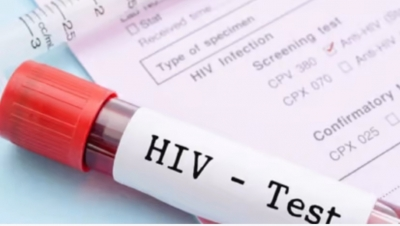UNAIDS warns of major setbacks in global HIV response, calls for renewed solidarity
By IANS | Updated: November 26, 2025 10:10 IST2025-11-26T10:09:02+5:302025-11-26T10:10:17+5:30
Geneva, Nov 26 A new report released by the Joint United Nations Programme on HIV/AIDS (UNAIDS) warns that ...

UNAIDS warns of major setbacks in global HIV response, calls for renewed solidarity
Geneva, Nov 26 A new report released by the Joint United Nations Programme on HIV/AIDS (UNAIDS) warns that the global HIV response has suffered its most significant setback in decades, urging reliance on solidarity, resilience, investment and innovation to achieve the goal of ending the AIDS epidemic.
Titled "Overcoming Disruption, Transforming the AIDS Response," the report highlights the severe impact of reduced international funding and a lack of global solidarity on HIV prevention efforts.
Abrupt cuts to international HIV aid in 2025 have worsened existing funding gaps, said the report, citing an estimate from the Organization for Economic Cooperation and Development that indicates external health assistance is expected to fall by 30-40 per cent in 2025 compared with 2023, which will lead to immediate and increasingly severe disruptions to health services in low- and middle-income countries.
The report shows that prevention services have been hit the hardest. Big cuts in supplies of HIV prevention medicines and steep drops in voluntary medical male circumcision have created a growing protection gap for millions. HIV prevention programs targeting young women have also been dismantled, leaving many adolescent girls and young women without prevention, mental health or gender-based violence services, which further increases their vulnerability.
The report warned that a failure to reach the 2030 global HIV targets outlined in the next Global AIDS Strategy could result in an additional 3.3 million new HIV infections between 2025 and 2030, Xinhua news agency reported.
Worldwide, 40.8 million people are living with HIV, 1.3 million new infections occurred in 2024, and 9.2 million people still lack access to treatment, according to UNAIDS.
Ahead of World AIDS Day on December 1, UNAIDS urged global leaders to reaffirm their commitment to solidarity, multilateralism and the shared effort to end AIDS, including maintaining funding for the HIV response, investing in innovation, upholding human rights and empowering communities.
"This is our moment to choose," said Winnie
"We can allow these shocks to undo decades of hard-won gains, or we can unite behind the shared vision of ending AIDS. Millions of lives depend on the choices we make today."
Disclaimer: This post has been auto-published from an agency feed without any modifications to the text and has not been reviewed by an editor
Open in app